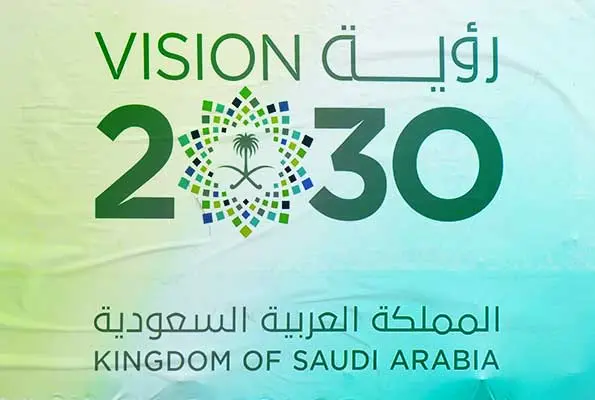Saudi Arabia is rapidly integrating artificial intelligence (AI) and large language models (LLMs) into its ambitious “Vision 2030” economic diversification plan. At the recent LEAP 2025 tech conference in Riyadh, the Kingdom unveiled a record USD 14.9 billion in new AI and digital infrastructure investments, underscoring an unprecedented tech boom aligned with “Vision 2030” goals.
Officials say these projects, spanning AI supercomputing, cloud data centres and robotics, will “accelerate Saudi Arabia’s transition toward an innovative and sustainable AI-driven economy, in line with Vision 2030 objectives.”
Massive AI Investments Drive Vision 2030 Goals
On the opening day of LEAP 2025, global tech giants and local players announced over USD 14.9 billion in deals, aiming to reinforce Saudi Arabia’s position as the largest digital economy in MENA.
US chipmaker Groq teamed with Aramco on a USD 1.5 billion project for AI-centric cloud computing, while Lenovo and Saudi Arabia’s Al‐Lat committed USD 2 billion to build an AI and robotics hub in Riyadh.
Google revealed plans for a regional AI infrastructure centre, and Qualcomm introduced a new Arabic language model, ALLaM, via its cloud platform. In addition, investments from Alibaba Cloud, Databricks, SambaNova, KKR, Salesforce and Tencent will bolster everything from local talent training to data centre capacity (adding up to 300 MW of computing power).
“The massive volume of new investments… reaffirms Saudi Arabia’s undisputed status as the primary digital accelerator in the Middle East and North Africa,” said Michael Champion, CEO of Tahaluf, LEAP’s co-organiser.
These efforts feed directly into Vision 2030’s targets. The digital economy already accounts for 15.6% of Saudi GDP, up from 14% in 2022. By boosting high-tech sectors, the Kingdom aims to grow non-oil GDP and generate high-skill jobs for its youthful population.
Notably, technology has “catalysed Saudi Arabia as the biggest success story in youth and female empowerment in the 21st Century,” MCIT Minister Abdullah Al‑Swaha said at LEAP, highlighting the surge in Saudi tech entrepreneurs and coders.
A Sovereign AI Ecosystem
Saudi Arabia is not just importing AI, it’s building its own. A flagship initiative is HUMAIN, a new Public Investment Fund-backed company launched by Crown Prince Mohammed bin Salman to develop “one of the world’s most powerful multimodal Arabic [LLMs]” and the supporting cloud infrastructure.
By developing homegrown GPT-style models like the ALLaM model introduced by Qualcomm, Saudi leaders aim to ensure that the Arabic language and cultural nuances are integrated into AI.
“Focusing on Arabic language LLMs…is certainly a step in the right direction towards building a strong local ecosystem,” said Counterpoint Research director Marc Einstein.
This sovereign AI push reflects a desire for digital independence and data security. As one analyst noted, “beyond language, it’s about…regional control and data sovereignty, setting a precedent for emerging markets to build locally grounded AI systems.”
These moves come as Saudi Arabia tops global rankings for government AI strategy. The Saudi Data & AI Authority has a national AI plan aiming to place the country among the top AI nations by 2030.
Supporting that ambition, the Kingdom is pouring resources into next-gen data centres and compute capacity. It now hosts 33 data centres with 42 more under development, and is leveraging its vast energy reserves to power energy-intensive AI computing. This muscle will support training giant GPT models and delivering AI services at scale.
Building Talent And A Digital Economy Base
Behind the shiny investments is a focus on people. Vision 2030’s digital transformation depends on cultivating tech talent and digital entrepreneurs. To that end, many LEAP initiatives include skill-building: Alibaba Cloud, for example, launched an “AI empowerment program” with Tuwaiq Academy and telecom STC to “train local talent in advanced technologies.”
New coding bootcamps, AI research scholarships, and tech hubs are proliferating, aiming to stem a regional brain drain and equip Saudis for the jobs of the future. The digital sector’s workforce is expanding – in 2023, Saudi ICT companies had operating revenues of SAR 236 billion and paid SAR 27.5 billion in salaries, indicating robust growth in tech employment.
Internationally, Saudi entities have also begun acquiring expertise; for instance, the Kingdom has wooed global AI experts and even invested in leading AI labs abroad to acquire knowledge and partnerships for its domestic projects.
Crucially, officials emphasise inclusion: increased participation of women and youth in tech is a highlight of recent years. Saudi female employment in ICT sectors has jumped, and programmes encourage more women to code and lead startups. This social impact is central to Vision 2030’s promise.
Regional Ripple Effects And Future Outlook
Saudi Arabia’s digital ambitions are spurring a broader Middle East AI race. Neighbours like the UAE have launched their LLMs (Abu Dhabi’s Falcon and Jais models) and national AI strategies.
“When the Kingdom works, the region works,” Minister Al‑Swaha observed – indeed, Riyadh’s push is positioning the Gulf as a new AI hotspot. International tech firms are now looking to Saudi Arabia as a base to serve the Arabic-speaking world, which could make Riyadh a regional innovation hub akin to Silicon Valley for MENA.
These investments hint at profound changes in innovation, employment and governance. AI initiatives are expected to create tens of thousands of jobs in software development, data science, and advanced manufacturing, helping reduce reliance on oil.
The government is also exploring AI in public services, from smart city infrastructure in NEOM to AI-driven healthcare and e-government platforms, which could improve efficiency but will require new regulations. Saudi officials have already issued AI ethics guidelines and data protection laws to guide this growth responsibly.
The world will be watching how these grand plans translate into homegrown breakthroughs – and whether Saudi Arabia can truly leap from energy superpower to an AI and digital economy powerhouse by 2030. For now, the buzz and capital at “LEAP 2025” signal that the intelligence age has arrived in the Kingdom, and it’s charging full speed ahead into new digital frontiers.


